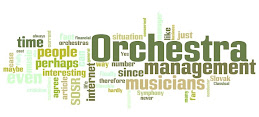Far back in the early 1980, as - being a young student - I was eagerly following music articles on conductors. At that time, a young Italian maestro, being labelled as a promising "prodigy" (still), appeared in some of the magazines. I still remember pictures, of a dark-haired, slim, youngish looking conductor. Television in Europe in those days was not as varied as it is today, and therefore my only knowledge of this young man was only from these articles and of his picture on certain yellow labeled vinyl records.
Only by the time, shortly after Herbert von Karajan had died, and the Berlin Philharmonic orchestra chose unexpectedly an Italian to succeed as the next chief, he became a bit more "visible". The rest is history.
Now, Claudio Abbado, in my view, the very best conductor around, has celebrated his 75th birthday. Despite (or perhaps because of) his leaving the Berliner - one reads about the growing differences between the orchestra and Abbado, yet the Berliner Philharmonic has gained so much from Claudio Abbado after the sterile megalomaniac era of von Karajan. I know from own experience, that a positive success is not always going hand in hand with a lasting co-operation, and ensembles realise too late, what opportunities they have lost by parting. The Berliner has become a more artistically aesthetic group than ever before, Abbado acting differently than his autocratic predecessor. Nevertheless... Also his health has perhaps contributed to becoming a very intellectual conductor, where music is the ultimate centre of the performance and not seeking self-fulfillment like many other conductors tend to do. These factors have made him a Maestro with a big capital M.
If I follow Claudio Abbado's path from his older Mahler recordings to the recent Lucerne Festival performances, the heights which he achieves with the Lucerne Orchestra are astonishing, almost giving me goose-bumps and seeing him conducting is the ultimate reflection on Mahler's message through his music. It manifests true understanding of music, not as a serie of black dots on a piece of paper, but searching the soul of piece. A view, and as it is not only in the case of Mahler, a philosophical view. Even for a Beethoven, Schubert, ... you name it.
Dear Claudio, wishing you still many years in good health, happiness and continuation of your musical success, from which we can learn a lot. Congratulazioni!
regards
MS
Only by the time, shortly after Herbert von Karajan had died, and the Berlin Philharmonic orchestra chose unexpectedly an Italian to succeed as the next chief, he became a bit more "visible". The rest is history.
Now, Claudio Abbado, in my view, the very best conductor around, has celebrated his 75th birthday. Despite (or perhaps because of) his leaving the Berliner - one reads about the growing differences between the orchestra and Abbado, yet the Berliner Philharmonic has gained so much from Claudio Abbado after the sterile megalomaniac era of von Karajan. I know from own experience, that a positive success is not always going hand in hand with a lasting co-operation, and ensembles realise too late, what opportunities they have lost by parting. The Berliner has become a more artistically aesthetic group than ever before, Abbado acting differently than his autocratic predecessor. Nevertheless... Also his health has perhaps contributed to becoming a very intellectual conductor, where music is the ultimate centre of the performance and not seeking self-fulfillment like many other conductors tend to do. These factors have made him a Maestro with a big capital M.
If I follow Claudio Abbado's path from his older Mahler recordings to the recent Lucerne Festival performances, the heights which he achieves with the Lucerne Orchestra are astonishing, almost giving me goose-bumps and seeing him conducting is the ultimate reflection on Mahler's message through his music. It manifests true understanding of music, not as a serie of black dots on a piece of paper, but searching the soul of piece. A view, and as it is not only in the case of Mahler, a philosophical view. Even for a Beethoven, Schubert, ... you name it.
Dear Claudio, wishing you still many years in good health, happiness and continuation of your musical success, from which we can learn a lot. Congratulazioni!
regards
MS
